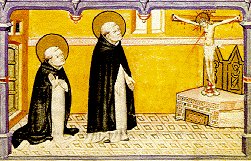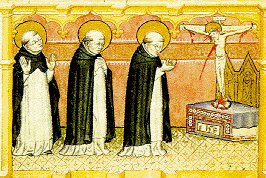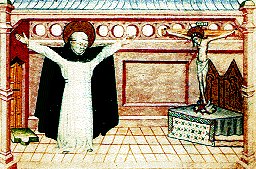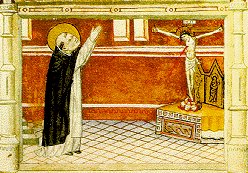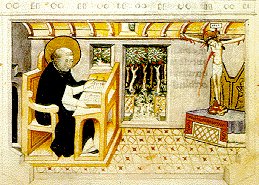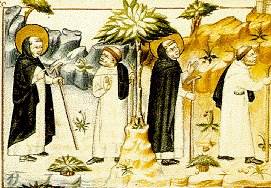
Holy teachers like Augustine, Ambrose, Gregory, Hilary, Isidore, John Chrysostom, John Damascene, Bernard, and other saintly Greek and Latin doctors have discoursed on prayer at great length. They have encouraged and described it, pointed out its necessity and value, explained the method, the dispositions which are required, and the impediments which stand in its way. In learned books, the glorious and venerable doctor, Brother Thomas Aquinas, and Albert, of the Order of Preachers, as well as William in his treatise on the virtues, have considered admirably and in a holy, devout, and beautiful manner that form of prayer in which the soul makes use of the members of the body to raise itself more devoutly to God. In this way the soul, in moving the body, is moved by it. At times it becomes rapt in ecstasy as was Saint Paul, or is caught up in a rapture of the spirit like the prophet David. Saint Dominic often prayed in this way, and it is fitting that we say something of his method.
Certainly many saints of both the Old and New Testament are known to have prayed like this at times. Such a method serves to enkindle devotion by the alternate action of soul upon body and body upon soul. Prayer of this kind would cause Saint Dominic to be bathed in tears, and would arouse the fervor of his holy will to such intensity that his bodily members could not be restrained from manifesting his devotion by certain signs. As a result, the spirit of the supplicant was sometimes raised up during its entreaties, petitions, and thanksgivings.
The following, then, are the special modes of prayer, besides those very devout and customary forms, which Saint Dominic used during the celebration of Mass and the praying of the psalmody. In choir or along the road, he was often seen lifted suddenly out of himself and raised up with God and the angels.
Saint Dominic's first way of prayer was to humble himself before the altar as if Christ, signified by the altar, were truly and personally present and not in symbol alone. He would say with Judith: "O Lord, God, the prayer of the humble and the meek hath always pleased Thee [Judith 9:16]. "It was through humility that the Canaanite woman and the prodigal son obtained what they desired; as for me, "I am not worthy that Thou shouldst come under my roof" [Matthew 8:8] for "I have been humbled before you exceedingly, O Lord [Psalm 118:107]."
In this way our holy father, standing erect, bowed his head and humbly considering Christ, his Head, compared his lowliness with the excellence of Christ. He then gave himself completely in showing his veneration. The brethren were taught to do this whenever they passed before the humiliation of the Crucified One in order that Christ, so greatly humbled for us, might see us humbled before his majesty. And he commanded the friars to humble themselves in this way before the entire Trinity whenever they chanted solemnly: "Glory be to the Father, and to the Son, and to the Holy Spirit." In this manner of profoundly inclining his head, as shown in the drawing, Saint Dominic began his prayer.
Saint Dominic used to pray by throwing himself outstretched upon the ground, lying on his face. He would feel great remorse in his heart and call to mind those words of the Gospel, saying sometimes in a voice loud enough to be heard: "O God, be merciful to me, a sinner." [Luke 18:13] With devotion and reverence he repeated that verse of David: "I am he that has sinned, I have done wickedly." [II Kings 24:17]. Then he would weep and groan vehemently and say: "I am not worthy to see the heights of heaven because of the greatness of my iniquity, for I have aroused thy anger and done what is evil in thy sight." From the psalm: "Deus auribus nostris audivimus" he said fervently and devoutly: "For our soul is cast down to the dust, our belly is flat on the earth!" [Psalm 43:25]. To this he would add: "My soul is prostrate in the dust; quicken Thou me according to Thy word" [Psalm 118:25].
Wishing to teach the brethren to pray reverently, he would sometimes say to them: When those devout Magi entered the dwelling they found the child with Mary, his mother, and falling down they worshiped him. There is no doubt that we too have found the God-Man with Mary, his handmaid. "Come, let us adore and fall down in prostration before God, and let us weep before God, and let us weep before the Lord that made us" [Psalm 94:61]. He would also exhort the young men, and say to them: If you cannot weep for your own sins because you have none, remember that there are many sinners who can be disposed for mercy and charity. It was for these that the prophets lamented; and when Jesus saw them, he wept bitterly. The holy David also wept as he said: "I beheld the transgressors and began to grieve" [Psalm 118:158].
At the end of the prayer which has just been described, Saint Dominic would rise from the ground and give himself the discipline with an iron chain, saying, "Thy discipline has corrected me unto the end" [Psalm 17:36]. This is why the Order decreed, in memory of his example, that all the brethren should receive the discipline with wooden switches upon their shoulders as they were bowing down in worship and reciting the psalm "Miserere" [Psalm 50] or "De Profundis" [Psalm 129] after Compline on ferial days. This is performed for their own faults or for those of others whose alms they receive and rely upon. No matter how sinless he may be, no one is to desist from this holy example which is shown in the drawing.
After this, Saint Dominic would remain before the altar or in the chapter room with his gaze fixed on the Crucified One, looking upon Him with perfect attention. He genuflected frequently, again and again. He would continue sometimes from after Compline until midnight, now rising, now kneeling again, like the apostle Saint James, or the leper of the gospel who said on bended knee: "Lord, if Thou wilt, thou canst make me clean" [Matthew. 8:2]. He was like Saint Stephen who knelt and called out with a loud cry: "Lord, do not lay this sin against them" [Acts 7:60]. Thus there was formed in our holy father, Saint Dominic, a great confidence in God's mercy towards himself, all sinners, and for the perseverance of the younger brethren whom he sent forth to preach to souls. Sometimes he could not even restrain his voice, and the friars would hear him murmuring: "Unto Thee will I cry, O Lord: O my God, be not Thou silent to me: lest if thou be silent to me, I become like them that go down into the pit" [Psalm 27:1] and comparable phrases from the Sacred Scripture.
At other times, however, he spoke within himself and his voice could not be heard. He would remain in genuflection for a long while, rapt in spirit; on occasion, while in this position, it appeared from his face that his mind had penetrated heaven and soon he reflected an intense joy as he wiped away the flowing tears. He was in a stage of longing and anticipation like a thirsty man who has reached a spring, and like a traveler who is at last approaching his homeland. Then he would become more absorbed and ardent as he moved in an agile manner but with great grace, now arising, now genuflecting. He was so accustomed to bend his knees to God in this way that when he traveled, in the inns after a weary journey, or along the wayside while his companions rested or slept, he would return to these genuflections, his own intimate and personal form of worship. This way of prayer he taught his brethren more by example than by words.
When he was in the convent, our holy father Dominic would sometimes remain before the altar, standing erect without supporting himself or leaning upon anything. Often his hands would be extended before his breast in the manner of an open book; he would stand with great reverence and devotion as if reading in the very presence of God. Deep in prayer, he appeared to be meditating upon the words of God, and he seemed to repeat them to himself in a sweet voice. He regularly prayed in this way for it was Our Lord's manner as Saint Luke tells us: ". . . according to his custom he entered the synagogue on the Sabbath and began to read" [Luke 4:16]. The psalmist also tells us that "Phinees stood up and prayed, and the slaughter ceased" [Psalm 105:30].
He would sometimes join his hands, clasping them firmly together before eyes filled with tears and restrain himself. At other times he would raise his hands to his shoulders as the priest does at Mass. He appeared then to be listening carefully as if to hear something spoken from the altar. If one had seen his great devotion as he stood erect and prayed, he would certainly have thought that he was observing a prophet, first speaking with an angel or with God himself, then listening, then silently thinking of those things which had been revealed to him.
On a journey he would secretly steal away at the time for prayer and, standing, would immediately raise his mind to heaven. One would then have heard him speaking sweetly and with supreme delight some loving words from his heart and from the riches of Holy Scripture which he seemed to draw from the fountains of the Savior. The friars were very much moved by the sight of their father and master praying in this manner. Thus, having become more fervent, they were instructed in the way of reverent and constant prayer: "Behold as the eyes of servants are on the hands of their masters, as the eyes of the handmaid are on the hands of her mistress . . ." [Psalm 122:2].
In a similar manner he prayed near Toulouse when he delivered the group of English pilgrims from danger of drowning in the river. Our Lord prayed thus while hanging on the cross, that is, with his hands and arms extended and "with a loud cry and tears ... he was heard because of his reverent submission" [Hebrews 5:7].
Nor did the holy man Dominic resort to this manner of praying unless he was inspired by God to know that something great and marvelous was to come about through the power of his prayer. Although he did not forbid the brethren to pray in this way, neither did he encourage them to do so. We do not know what he said when he stood with his hands and arms extended in the form of a cross and raised the boy to life. Perhaps it was those words of Elias: "O Lord, my God, let the soul of this child, I beseech thee, return into his body" [III Kings 17:21]. He certainly followed the prophet's exterior manner in his prayers on that occasion. The friars and sisters, however, as well as the nobles and cardinals, and all others present were so struck by this most unusual and astonishing way of prayer that they failed to remember the words he spoke. Afterwards, they did not feel free to ask Dominic about these matters because this holy and remarkable man inspired in them a great sense of awe and reverence by reason of the miracle.
In a grave and mature manner, he would slowly pronounce the words in the Psalter which mention this way of prayer. He used to say attentively: "O Lord, the God of my salvation: I have cried in the day and in the night before Thee," as far as that verse "All the day I have cried to Thee, O Lord: I stretched out my hands to Thee" [Psalm 87:2-10]. Then he would add: "Hear, O Lord, my prayer give ear to my supplication in Thy truth . . ." He would continue the prayer to these words: "I stretched forth my hands to Thee . . . Hear me speedily, O Lord" [Psalm 142:1-7].
This example of our father's prayer would help devout souls to appreciate more easily his great zeal and wisdom in praying thus. This is true whether, in doing so, he wished to move God in some wonderful manner through his prayer or whether he felt through some interior inspiration that God was to move him to seek some singular grace for himself or his neighbor. He then shone with the spiritual insight of David, the ardor of Elias, the charity of Christ, and with a profound devotion, as the drawing serves to indicate.
While praying, he was often seen to reach towards heaven like an arrow which has been shot from a taut bow straight upwards into the sky. He would stand with hands outstretched above his head and joined together, or at times slightly separated as if about to receive something from heaven. One would believe that he was receiving an increase of grace and in this rapture of spirit was asking God for the gifts of the Holy Spirit for the Order he had founded.
He seemed to seek for himself and his brethren something of that transcendent joy which is found in living the beatitudes, praying that each would consider himself truly blessed in extreme poverty, in bitter mourning, in cruel persecutions, in a great hunger and thirst for justice, in anxious mercy towards all. His entreaty was that his children would find their delight in observing the commandments and in the perfect practice of the evangelical counsels. Enraptured, the holy father then appeared to have entered into the Holy of Holies and the Third Heaven. After prayer of this kind he truly seemed to be a prophet, whether in correcting the faulty, in directing others, or in his preaching.
Our holy father did not remain at prayer of this type very long but gradually regained full possession of his faculties. He looked during that time like a person coming from a great distance or like a stranger in this world, as could easily be discerned from his countenance and manner. The brethren would then hear him praying aloud and saying as the prophet: "Hear, O Lord, the voice of my supplication which I pray to Thee, when I lift up my hands to Thy holy temple" [Psalm 27:2].
Through his words and holy example he constantly taught the friars to pray in this way, often repeating those phrases from the psalms: "Behold, now bless ye the Lord, all ye servants of the Lord ... in the nights lift up your hands to the holy places, and bless ye the Lord" [Psalm 133:1-3], "I have cried to Thee, O Lord, hear me; hearken to my voice when I cry to Thee. Let my prayer be directed as incense in Thy sight; the lifting up of my hands as the evening sacrifice" [Psalm 140:1-2]. The drawing shows us this mode of prayer so that we may better understand it.
Our Father, Saint Dominic, had yet another manner of praying at once beautiful, devout, and pleasing, which he practiced after the canonical hours and the thanksgiving following meals. He was then zealous and filled with the spirit of devotion which he drew from the divine words which had been sung in the choir or refectory. Our father quickly withdrew to some solitary place, to his cell or elsewhere, and recollected himself in the presence of God. He would sit quietly, and after the sign of the cross, begin to read from a book opened before him. His spirit would then be sweetly aroused as if he heard Our Lord speaking, as we are told in the psalms: "I will hear what the Lord God will speak to me. [Psalm 84:9]. As if disputing with a companion he would first appear somewhat impatient in his thought and words. At the next moment he would become a quiet listener, then again seem to discuss and contend. He seemed almost to laugh and weep at the same time, and then, attentively and submissively, would murmur to himself and strike his breast.
Should some curious person have desired to watch our holy father Dominic, he would have appeared to him like Moses who went into the desert, to Horeb, the sacred mountain of God, and there beheld the burning bush and heard the Lord speaking to him as he was bowed down in the divine presence. This holy custom of our father seems, as it were, to resemble the prophetic mountain of the Lord inasmuch as he quickly passed upwards from reading to prayer, from prayer to meditation, and from meditation to contemplation.
When he read alone in this solitary fashion, Dominic used to venerate the book, bow to it, and kiss it. This was especially true if he was reading the Gospels and when he had been reading the very words which had come from the mouth of Christ. At other times he would hide his face and cover it with his cappa, or bury his face in his hands and veil it slightly with the capuce. Then he would weep, all fervent and filled with holy desires. Following this, as if to render thanks to some person of great excellence for benefits received, he would reverently rise and incline his head for a short time. Wholly refreshed and, in great interior peace, he then returned to his book.
Our Father, Saint Dominic, observed this mode of prayer while traveling from one country to another, especially when he passed through some deserted region. He then delighted in giving himself completely to meditation, disposing for contemplation, and he would say to his companion on the journey: It is written in Osee "I will lead her (my spouse) into the wilderness and I will speak to her ear" [Osee 2:14]. Parting from his companion, he would go on ahead or, more frequently, follow at some distance. Thus withdrawn, he would walk and pray; in his meditation he was inflamed and the fire of charity was enkindled. While he prayed it appeared as if he were brushing dust or bothersome flies from his face when he repeatedly fortified himself with the Sign of the Cross.
The brethren thought that it was while praying in this way that the saint obtained his extensive penetration of Sacred Scripture and profound understanding of the divine words, the power to preach so fervently and courageously, and that intimate acquaintance with the Holy Spirit by which he came to know the hidden things of God.



